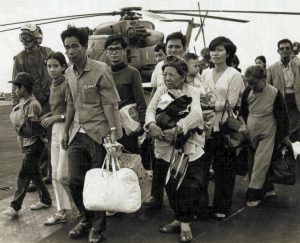Summary
The long U.S. military involvement in Vietnam, justified as preventing its fall to communism, consumed vast resources and fostered public distrust in the federal government and U.S. imperialism. With the loss of this war, the government assumed responsibility to provide refuge for displaced Vietnamese, and their neighboring Cambodians, Laotians, and Hmong. The United States made provisions to admit about 135,000 Vietnamese and other Southeast Asians in the months following the fall of Saigon, resettle them across the United States with some resources to help them establish new lives. The standards for assistance were based on that provided for Cuban refugees from communism in the 1966 Cuban Adjustment Act. In 1978, a new round of persecutions forced hundreds of thousands more to flee by boats and overland but these later refugee waves took longer to find new homes.

Source
To enable the United States to render assistance to, or in behalf of, certain migrants and refugees.
SEC. 2. (a) Subject to the provisions of subsection (b) there are hereby authorized to be appropriated, in addition to amounts otherwise available for such purposes, $155,000,000 for the performance of functions set forth in the Migration and Refugee Assistance Act of 1962 (76 Stat. 121), as amended, with respect to aliens who have fled from Cambodia or Vietnam, such sums to remain available in accordance with the provisions of subsection (b) of this section.
SEC. 3. In carrying out functions utilizing the funds made available under this Act, the term “refugee” as defined in section 2(b) (3) of the Migration and Refugee Assistance Act of 1962, as amended, shall be deemed to include aliens who (A) because of persecution or fear of persecution on account of race, religion, or political opinion, fled from Cambodia or Vietnam; (B) cannot return there because of fear of persecution on account of race, religion, or political opinion; and (C) are in urgent need of assistance for the essentials of life.
Approved May 23, 1975.
Analysis
Background Information from F. Odo:
The ill-fated war in Southeast Asia officially ended with the retreat of the United States in 1975. With this withdrawal, however, came immense responsibility for the hundreds of thousands of Vietnamese, Cambodians, and Laotians we had recruited in the war against communism. Indeed, many of them paid a fearful price when South Vietnam fell and American protection disappeared. In partial recompense, the United States began a refugee program to admit some of the populations displaced. One of the first significant acts of Congress to acknowledge this responsibility came the year the United States left. The actual policy of dispersing Vietnamese and Cambodian refugees into all states except Alaska was a disaster, however, and subsequent legislation such as the Refugee Act of 1980 attempted to improve the situation. In the decade after this act, more than 750,000 refugees entered the country from Southeast Asia. Their communities have become among the largest and most complex of Asian Americans in the nation, especially with regard to extreme gaps in status, education, and wealth (p 407).
Excerpt from:

